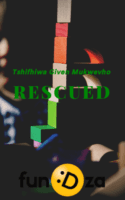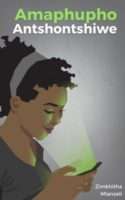You are a smart child, you have loving parents, friends, a nice home, and you are well-mannered and pleasant. On top of this you are even very handsome! Your life and future should be great, right?
Yet, you, Lutendo, are often isolated, are cruelly teased, and denied an education. Your parents don’t allow you to do even slightly adventurous things, such as go a certain distance from home to play soccer. Certainly you can’t go to, let alone swim in the dam. All this just because you were born without fingers, and with some wrongly-formed limbs.
The opening scene of Rescue points to the struggles that lie ahead for Lutendo and his parents. Instead of celebrating his birth they feel God has punished them. Instead of looking forward to him being a successful ‘vet or chartered accountant’ they already feel fearful and hopeless about him:
“My baby will go through a lot of hardship,” says Mr Munyaimukalanga. His wife imagines that he can “… become a beggar, sitting with a can on the pavement, asking some coins from passers-by?”
It is human nature that every parent wants a baby born ‘perfect’, and it is a devastating shock to find out your child has a disability.
The experienced doctor helps them to see and accept that this child too, is a “gift from God” who they must love and cherish. He will be able to attend a school for children with disabilities, so will be okay. Look what he wisely advises:
“So now I urge you to celebrate the birth of your child who has so much potential in life. Do not put limitations, and your anxiety, on him before he has even said his first word or taken his first step.”
Our Constitution points out that at everyone, including people with disabilities, have the right to dignity, to an education, to not be discriminated against in any way. Everyone should be able to reach their potential in life.
As the story goes on, we see that the parents have indeed been able to accept and love their child. But, unfortunately, they have not been able to follow the doctor’s advice, or what our Constitution says, about ‘limitations’ and ‘anxiety’ and schooling.
Mrs Munyaimukalanga especially is constantly worrying about Lutendo and protecting him from ‘life’. She teaches him to read, but won’t send him to school. She fears he would not cope, and we can see her point. Why let your precious child endure ‘the world out there’ where even his best friends tease him and reject him at times? She just wants him safe in and near home, where he can’t be harmed mentally or physically.
Look how the boys do, as she fears, tease and disrespect him. But look too at how his overprotective parents are adding to his challenges, by further ‘disabling’ him mentally and socially:
“What is little Lutendo laughing at?” asks Ndiafhi, feeling humiliated by his drawing. “He’s a little boy and not men like the two of us,” he points at Lawrence then at himself. “I am at school that’s how I know what a tortoise is. Lutendo doesn’t even go to school. He knows nothing!”
Lutendo longs to be more independent, like almost all growing children, and eventually rebels against his mother. Yet, he is mocked even more cruelly, when he finally bravely joins in a soccer game. Instead of encouraging and helping him enjoy playing, this happens:
“When Lutendo raises his head, drenched in sweat, he sees all the boys looking at him and laughing. Some are even jeering at him.
… In frustration, Lutendo falls to the ground. Tears prick his eyes as he wraps his arms around his legs. The others stop playing football and crowd around him, laughing. Even his two friends, Ndiafhi and Lawrence, laugh.
It is a painful scene to read, sharply illustrating the unfair and cruel divide society places between being able-bodied and having a disability of some sort. It has nothing to do with the whole person you really are; it is simply to do with a part of your body!
But soon, we learn why, in a caring society, we should rather talk about ‘differently abled’, yet full members of our communities. At the climax of the story it is Lutendo who is the sensible, smart kid who doesn’t panic and think wildly in a crisis. He at once realises adult help is needed to save a drowning child. Perhaps it is even his disability that has taught him that is okay, and not weak, to ask for help? That is a lesson we can all learn.
The artist, Malume Jackson, who rescues the child, sees at once that Lutendo’s loving parents must be challenged. (And isn’t it great when he gives the other arrogant boys a tongue lashing!? It’s a life lesson about humility, and seeing things as they really are with smart Lutendo.)
Mr Munyaimukalanga quickly agrees that they have been wrong: “Malume is right. The boy needs to be in school with other children. You can’t protect him forever. He needs to have a life of his own and learn to be independent.”
Soon Lutendo is flourishing in a school where he is respected, and the focus is on his abilities, not his disabilities. The Principal tells him, “You are going to have a fruitful, enriching, stay here, Lutendo.”
One of the main themes of the story is the human longing to be free, to be enabled to follow your dreams. Lutendo certainly is doing this by the happy end of the story. His success transforms his over-anxious parents too: “But the biggest prize is the look on his parents’ faces …”
It is important, though, to point out that we must look at disabilities on a person-by-person basis. Some people have a disability that is very minor; some people have severe disabilities and need constant care, in special institutions. They may have mental conditions that make school impossible.
This leads into discussing another divide. Today educationists say that schools should all be equipped to ‘mainstream’ as many people with disabilities as possible, rather than separating them all off into special schools. This means providing things like wheelchair ramps, and teacher aides and, in the case of Lutendo, a scribe (person to write for him). The children do better educationally and socially by being with ‘everyone else’, where they belong.
In Lutendo’s case, first, he is way behind his peers because of not attending until he was nine. Second, his disability makes it impossible for him to be in a normal classroom, as things stand in South Africa today. Although it is the goal of our Education Department, we still have very, very few inclusive schools. But, as the story shows, he is very happy to be with people like his blind best friend, at last living a full life.
It is heartbreaking to know that up to 70% of children with disabilities do not attend any school! (You can read in detail about rights of people with disabilities in South Africa here.) Even worse, is to know that often this is because their parents or communities do not consider them ‘worth’ educating. At least Lutendo’s mother was doing it out of love and fear for her child.
Rescued also touches on another divide in our society: male and female. Today you commonly hear the term ‘toxic masculinity’. It means a type of manliness that is harmful and ‘poisoning’. Lutendo’s young friends show early signs of this when they insult him in this way:
“I have said it many times that Lutendo is not a real man, and here now is proof,” Lawrence says.
“Which means he is a girl,” adds Ndiafhi.
What these young boys are saying is that being female, is a kind of disability! Precious and Lutendo themselves seem to accept that they are lumped together, and have to be less adventurous than boys: “Lutendo thinks about Precious and what she said: ‘Didn’t our mothers warn us about going anywhere far away from home?’”
Lutendo ends up using his toes to become an excellent painter, and uses a human scribe for writing. But to end, it is worth noting that marvellous technology is constantly being invented and improved to lessen the divide between ‘the disabled, and us’ in the world. It is enabling many, many people with disabilities to be educated, work, and live full and meaningful, independent lives of their own choosing.
This technology includes electric wheelchairs, voice-recognition software for computers, cochlear ear implants for deaf people, and robotic arms or hands – for a person like Lutendo, for example. At the moment it is mostly very expensive … but we can hope and work towards a future when it can be provided to all who need it. Read more here.
Tell us: Is there good state and community support for disabled people where you live? If so, what is it? If not, what challenges do, e.g. people in wheelchairs, face? Do you think your community treats people with disabilities with dignity, as equals to able-bodied people?






